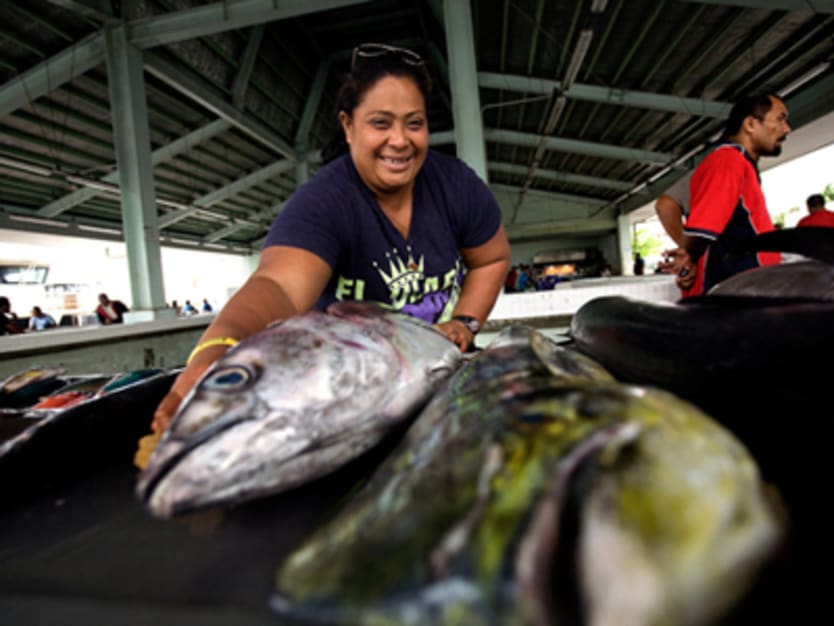
At the helm of the Asian Development Bank main kitchen stands executive chef Chris Leaning, an imposing figure that not only runs the place like clockwork but also wants to help the environment through the food he prepares.
Plump and heavily tattooed, Leaning oversees every single detail, from the menu to presentation, including size in proteins, price range.
“I don’t dictate but I show how dishes should be cooked, and I work with the staff on the recipes. I always approve or disapprove everything that comes out of the kitchen,” he said before serving a dinner to mark World Environment Day at the ADB headquarters in Manila.
The event included George, a 39-kg tuna “responsibly” caught as part of an agreement between the multilateral institution and the World Wild Fund for Nature to support sustainable fishing in the Philippines and in line with the bank’s No Impact strategy launched in March to promote sustainable development and environmentally-friendly practices among its employees.
Protecting local tuna
The tuna industry in Asia-Pacific is one of the largest in the world, generating up to $1 billion in annual revenue and employing over 6 million people, according to the region’s 2012 Ecological Footprint and Investment in Natural Capital published by ADB and WWF.
In the Philippines alone, about 1.5 million people depend on the sector and tuna is the main source of protein for the poor living in the country’s coastal areas.
However, with the alarming rise in tuna production, the ability of reef systems to provide food for coastal populations in the whole region is predicted to decrease by 50 percent by 2050, which led ADB to start collaborating with WWF on responsible and sustainable management of tuna resources over a decade ago.
Leaning is a big supporter of using responsibly-caught tuna and is aware of some of the ills related to unsustainable fishing, like the accidental catch of other valuable species such as turtles and dolphins through indiscriminate fishing methods.
He even advocates the importance of traceability or being able to trace the tuna’s origins: the name of the fisherman who caught it, where they got the fish from, how it was caught, when it was killed and who butchered it.
The chef explained how through this smart consumer perspective that ADB started using responsibly-caught tuna: “When we have functions with high level personalities at the executive dining room, I go … and talk to them, explaining about the food on their table … Especially when they order tuna, I have a little chat about the fish and why the ADB is highlighting responsible fishing.”
No Impact
ADB started its No Impact initiative last March, and Devex reported on how one of the bank’s top executives was lauded by Filipinos on social media for taking public transportation instead of using his private car.
The goal of the campaign, noted the chef, “is to educate people in the bank on the little things they do that create an impact on a macro perspective [in] the plastic cups they use, the food they take in or waste.”
Initially, Leaning was reluctant to participate, but after he helped his team develop new and innovative recipe the chef was fully on board and realized the benefits of doing something different and creative and more importantly, have a positive impact.
“By doing this, we can make an impact and the impact is, no impact!” he quipped. “We’re also helping local people by buying their produce, as well as ensuring food security for our future generation.”
The campaign also included using more local products, cutting down on imported items to make even ingredients sustainable and so food can move directly from “farm to plate,” in ADB’s sprawling complex in Manila, where at least 4,000 meals are served daily.
In addition, Leaning said that supporting local produce is not only good for the environment but the local economy as well, and food is just one part of a sustainable lifestyle that also means using the stairs instead of the elevator, which achieves the twin goal of saving energy “and getting fit in the process.”
Edited for style and republished with permission from WWF. Read the original article.
